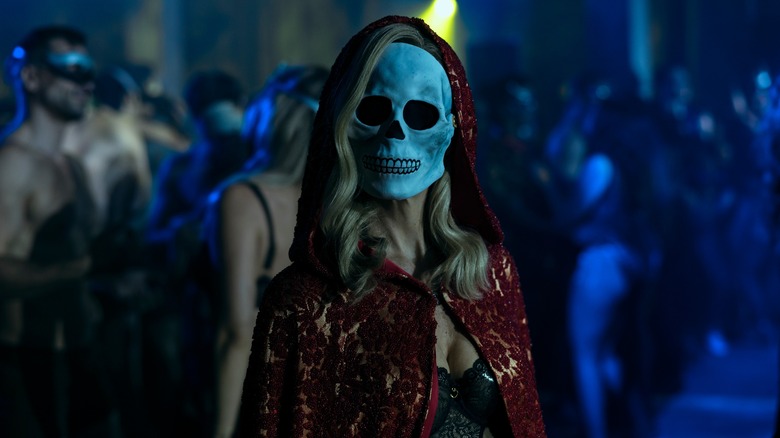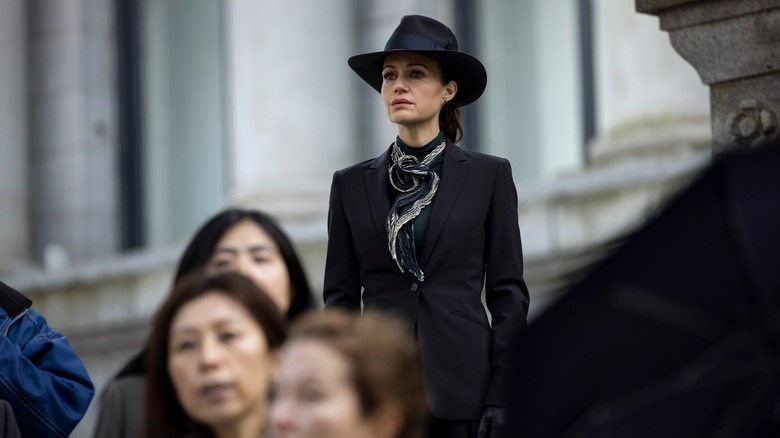The Fall Of The House Of Usher: Who (Or What) Does Carla Gugino Play?
Contains spoilers for "The Fall of the House of Usher"
Events in "The Fall of the House of Usher" aren't always what they appear to be. Like the Edgar Allan Poe stories and poems that inspired the Netflix series, Mike Flanagan's work is packed with metaphors, symbols, and unanswered mysteries. But Flanagan knows that the illusiveness of supernatural stories is central to their fun, and his previous horror shows have generally left plotlines open for interpretation. But "The Fall of the House of Usher" has one baffling mystery at its center: Who — or what — is the character played by Carla Gugino?
In the show, she goes by many names. She's a security guard, a patient with a heart problem, a construction worker, the proprietor of a cat shelter, and more — something different to each member of the Usher family before they die. But what is she? Netflix's Tudum described her as "a shape-shifter named Verna, whose origins can be traced back to a — let's just say — very famous Poe character." In that same article, Gugino herself took a crack at explaining the role. "There is a fantastical supernatural element to the story, and she is the manifestation of that," the actor said. "You could say she's the executor of fate or the executor of karma."
Still, these explanations don't fully answer the mystery of Verna. Is she death itself? Some ancient deity? Simply the raven, and nothing more?
Verna's name provides a clue to her identity
In "The Fall of the House of Usher" Episode 2, Verna takes her first Usher life — Prospero (Sauriyan Sapkota). She infiltrates his grotesque masquerade orgy for the rich and shameless wearing a red robe and a mask of death. When she confronts Prospero, she tells him something interesting: "You bad boys, you always just loved me." Earlier in their conversation, she gives another clue. "It's my kind of party," she tells him. "Sex, yes, but with a dash of Rome"
In Roman mythology, Laverna is the goddess of thieves and liars. She has a strong association with death and the underworld, as well as, curiously enough, cats. Poe references Laverna in his short story "The Murders in the Rue Morgue," which is also the first appearance of his C. Auguste Dupin character (who appears in the Netflix show) and is the main inspiration behind the death of Camille (Kate Siegel) in Episode 3. The similarity between the names Verna and Laverna can't be a coincidence, especially after the former's reference to Rome.
So, what does that mean? Well, Verna is probably everything she appears to be — an agent of death and fate, yes, but also one particularly interested in the lives of the cruel and corrupt. This second trait becomes clear after Arthur Pym (Mark Hamill) investigates Verna and connects her to numerous rich and powerful people throughout history.
Verna is inspired by a goddess, but she isn't one
Though much of Verna's shadowy nature can be explained by her connection to Verna, that isn't the whole truth of the character. She's also the raven of yore — the one named and described in Poe's most famous creation. She's turned into an all-consuming force of nature in the Netflix series.
But that's not all ...
The most curious detail about Verna comes from Arthur Pym. In his confrontation with her, he recalls seeing Verna decades prior during the Transglobe Expedition. That means that the stories Pym would tell the Usher children — stories about an "island at the top of the world" that was "the realm of beings who lived beneath us, out of time, and out of space" — were surely true.
So, what is Verna, then? She's an ancient and possibly eternal being who dwells within the Hollow Earth but rises up to play her games of fate with the world's most corrupt and powerful humans. She's someone who the Romans perceived as a goddess, but who likely doesn't belong to a pantheon. In a strictly literary sense, she's the manifestation of comeuppance — the grinning, glowering face of karma that must inevitably come to claim Earth's evil denizens.


